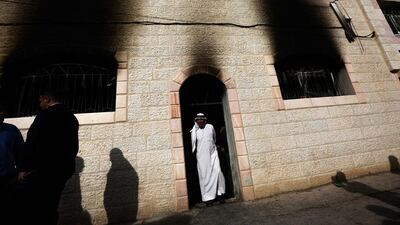RAMALLAH // Israeli authorities have given preliminary approval for construction of 200 new homes in east Jerusalem — a move that could ratchet up already-heightened tensions in the holy city.
Amnon Arbel, the deputy head of planning in the Jerusalem municipality, said a planning committee approved the project Wednesday in the Ramot area.
Mr Arbel said the project needs to clear other hurdles and construction is years away.
The Palestinians claim east Jerusalem as their capital, and the international community opposes Israeli construction in the area.
An attack against a mosque in a West Bank village on Wednesday ignited a fire that destroyed its first floor, an assault the village's mayor blamed on Jewish settlers. The attack came against the background of competing claims to a holy site in Jerusalem's Old City.
The fire broke out before dawn in the village of Mughayer, north of Ramallah, said Mayor Faraj Al Naasan. He said efforts of residents and Palestinian fire services to quell the blaze succeeded only in saving the building’s second floor.
The mayor said he had no doubt that Jewish settlers were responsible, citing a previous settler attack against another mosque in the village two years ago and frequent settler attacks against vehicles and olive groves there.
“Only Jewish settlers would do this,” Mr Al Naasan said.
In a related incident, Israeli police said a Molotov cocktail was thrown at an ancient synagogue in the Israeli-Arab town of Shfaram on Tuesday night, causing light damage.
The attacks came as Israeli-Palestinian tensions are soaring, mostly against the background of competing claims to a holy site in Jerusalem’s Old City.
Visits by Jewish worshippers to the site — known to Jews as the Temple Mount and to Muslims as the Noble Sanctuary — have raised concerns among Muslims that Israel is secretly trying to take over the site. This in turn has fanned strife in a region already on edge following the collapse of US-led peace talks, Israel’s bloody war last summer in the Gaza Strip, and new Israeli settlement construction plans in east Jerusalem.
The tensions at the shrines have frequently boiled over into violent demonstrations, though Israeli prime minister Benjamin Netanyahu has insisted that Israel has no plans to change the status quo at the Jerusalem holy sites.
Palestinian president Mahmoud Abbas and Netanyahu traded accusations on Tuesday over the tensions, with Mr Abbas saying that frequent visits to the site by Jewish worshippers are fuelling clashes and accused Israel of leading the region toward a “religious war.” The Israeli leader said Mr Abbas was making matters worse and inflaming tempers.
Mr Abbas’ adviser Nabil Abu Rdeneh said Mr Abbas was scheduled to meet US secretary of state John Kerry in the Jordanian capital of Amman on Thursday, and would emphasise his concerns about alleged Israeli attempts to change the status quo at the Jerusalem holy site.
Israeli police spokesman Micky Rosenfeld said police were deployed later Wednesday near the entrance to Mughayer but that “disturbances in the area” were preventing them from opening an investigation.
Mr Rosenfeld did not elaborate on the extent of the disturbances but attacks such as the one in Mughayer frequently ignite violent protests.
Also Wednesday, the Israeli human right organisation Yesh Din published data on what it described as failure by the Israeli police in the West Bank to seriously investigate Palestinian complaints of Israeli attacks against Palestinians and their property.
The organisation said that of the 1,045 cases opened by the police on such attacks between 2005 and 2014, only 7.4 per cent had produced indictments of Israeli civilians. The police were not immediately available to comment on the report.
Meanwhile, an Israeli border policeman was arrested in connection with the death of a Palestinian demonstrator near Ramallah in May, Mr Rosenfeld said. Israeli security forces said they used only rubber bullets to disperse the protesters, but Israeli media have reported that the border policeman may have used live fire during the incident.
Meanwhile, jailed Palestinian leader Marwan Barghuti has been placed in solitary confinement after publishing a letter calling for a return to “armed resistance” against Israel, a Palestinian NGO said on Wednesday.
The Ramallah-based Palestinian Prisoners’ Club said in a statement that Mr Barghuti had been placed in solitary as a “punishment” for a letter published on Tuesday on the 10th anniversary of the death of veteran Palestinian leader Yasser Arafat.
A spokesman for Israel Prisons Service confirmed Mr Barghuti had been placed in solitary but said it was because he had given interviews to the press.
* Associated Press, Agence France-Presse

